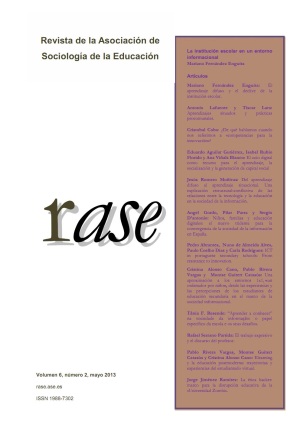Elearning and postmodern education: paths and virtual student experiences
DOI:
https://doi.org/10.7203/RASE.6.2.8361Keywords:
Elearning, Sociology of Education, Modernity, Postmodernism, Virtual Student, Information Society Abstract
Abstract
The emergence and dynamics of Elearning in the current scenarios of higher education, evidence of a major transformation occurred in the context of the information society: the use of ICT in the process of knowledge construction. This change has gone together, first, the improvement in the quality and formative offer, an offer that has sought to be more inclusive and representative of current social demands. And secondly, it is a modality that has tried to adapt to the current features of digital and digitized students (Prensky, 2006), whose role in the teaching process, tends to be more active than in traditional training models. This article focuses on this second dimension, analyzing how the Elearning tries to be an element of mediation between the current changes occurring in higher education and the emergence of new virtual students, more active and independent.
 Downloads
Downloads
Downloads
Published
How to Cite
-
Abstract790
-
PDF (Español)186
Issue
Section
License
![]()
This work is licensed under a Creative Commons Reconocimiento-NoComercial-CompartirIgual 4.0 Internacional.




